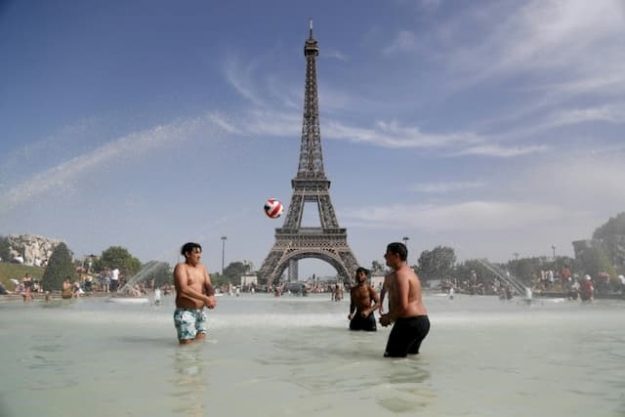Heat Wave: The Red Alert is Lifted but France is still Suffocating

A good part of France will suffocate this Saturday, the sixth day of an exceptional heat wave where the temperatures have brushed the 46 ° C in the South. A record.
Meteo France has lifted this Saturday the red alert for “heat wave” but much of France is still suffocating, the sixth day of an exceptional heat wave where the temperatures have brushed the 46 ° C in the South, a record.
Read also: Heat wave: the absolute record of heat reaches 45.9 ° C in the Gard
The red alert at the heatwave, which had been introduced for the first time in France, was raised Saturday in the southern departments that were concerned ( Bouches-du-Rhone, Gard, Herault and Vaucluse ) and returned to orange vigilance.
The extreme heat coming from the Sahara goes back to the north of the country, and the Paris region will experience its hottest day of the week “with 36 to 38 degrees of the day,” predicts Météo France, which announces “a very hot day on a broad central band ‘of the country.
We breathe in Brittany
The institute is expecting locally 40 ° C in the Mediterranean hinterland. “On the rest of the country, temperatures will reach 35 to 39 degrees in most regions, locally exceeding 40 degrees in the Center,” according to Météo France, which maintains 80 departments in orange vigilance.
The Breton and Cotentin peaks will completely escape the heat and in other places like the Atlantic facade, temperatures will be relatively mild.
For this weekend, which coincides with the first departures on vacation, Transport Minister Elisabeth Borne urged those who can “shift their travel” by car and by train, the tracks have been tested by the peak of heat.
Especially since over a large part of the country, the heat wave is accompanied by ozone pollution irritating to the lungs: the Alpes-de-Haute-Provence, the Alpes-Maritimes and the Var have reached the maximum level. alert, such as Bouches-du-Rhône and Vaucluse.
In Lyon, Grenoble, as in Marseille and Paris the differentiated traffic, which prohibits traffic to older vehicles, was introduced to try to fight against this phenomenon.
“Valley of Death”
The mercury flew Friday, with an absolute record recorded in Gallargues-le-Montueux (Gard): 45.9 ° C at 4pm. It shatters the previous record of 44.1 ° C recorded in Saint-Christol-lès-Ales and Conqueyrac, in the same department, which dated August 2003 when the heat wave had killed 15,000 people.
“This is a first in France since we made temperature measurements (around the beginning of the 20th century, ed). The 45 ° C bar was crossed for the first time “, commented Meteo France, comparing this level to that” which one reaches during a normal August day in the Valley of Death “, in California.
Beyond the extreme values recorded in the other red vigilance departments, as well as in the Var, at more than 44 ° C, almost all of France has transpired. It was 33 ° C in Paris and Troyes, 35 ° C in Mâcon, or 38 ° C in Nevers.

As the authorities feared, the intense heat favoured the departure of wildfires in the South. At 10pm on Friday, about thirty fires were still active, almost all in the Gard, with some 300 hectares travelled in total.
Houses burned in different localities, a factory caught fire in Sorgues (Vaucluse), and the A54 motorway between Nîmes and Arles (Bouches-du-Rhône) was still cut in a direction in the evening due to a fire.
In the afternoon, the heat had emptied the streets and terraces. “We do not know what to do, we can not stay in the camper with the engine and air conditioning all day long,” said Matthew Crawford, who had come to Villevieille with his girlfriend from Cornwall.
“We wanted sun and heat but frankly, it’s unbearable! “. This city of Gard held a few minutes the heat record, at 45.1 ° C.
Faced with these exceptional circumstances, the authorities have multiplied the messages of caution, beyond the only fragile people: the Minister of Health Agnès Buzyn called to avoid “any unnecessary effort”.
“We are not managing an exceptional crisis, we are managing a phenomenon that will recur” because of global warming, said Interior Minister Christophe Castaner, in Marseille. Scientists anticipate two to three times more heat waves by mid-century.
In Paris, the National Assembly adopted in the first reading the bill on energy and climate that decrees the “ecological and climatic urgency” and plans to achieve “carbon neutrality” by 2050.
A policy too ambitious, according to the High Council for Climate (HCC) set up by Emmanuel Macron, NGOs, or the 150 or so activists of Youth for climate, Fridays for Future Germany (FFFG) and Extinction Rebellion, which have demonstrated several hours in front of the Elysee.
Enjoyed this? Get the week’s top France stories
One email every Sunday. Unsubscribe anytime.


